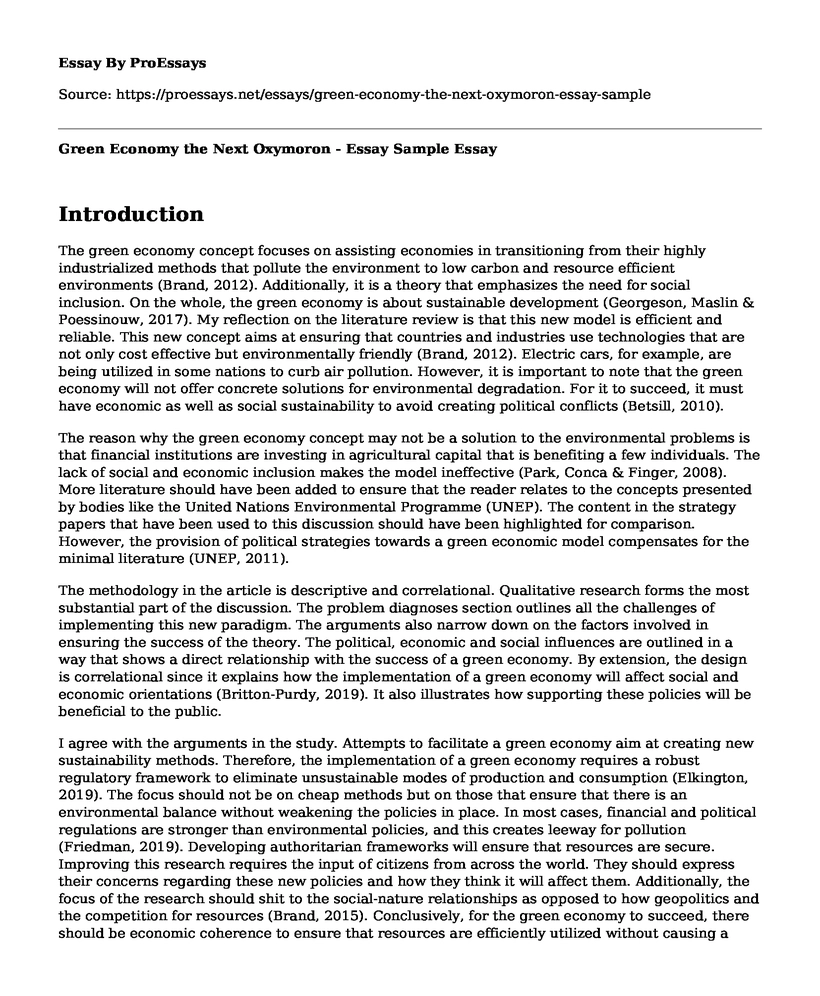Introduction
The green economy concept focuses on assisting economies in transitioning from their highly industrialized methods that pollute the environment to low carbon and resource efficient environments (Brand, 2012). Additionally, it is a theory that emphasizes the need for social inclusion. On the whole, the green economy is about sustainable development (Georgeson, Maslin & Poessinouw, 2017). My reflection on the literature review is that this new model is efficient and reliable. This new concept aims at ensuring that countries and industries use technologies that are not only cost effective but environmentally friendly (Brand, 2012). Electric cars, for example, are being utilized in some nations to curb air pollution. However, it is important to note that the green economy will not offer concrete solutions for environmental degradation. For it to succeed, it must have economic as well as social sustainability to avoid creating political conflicts (Betsill, 2010).
The reason why the green economy concept may not be a solution to the environmental problems is that financial institutions are investing in agricultural capital that is benefiting a few individuals. The lack of social and economic inclusion makes the model ineffective (Park, Conca & Finger, 2008). More literature should have been added to ensure that the reader relates to the concepts presented by bodies like the United Nations Environmental Programme (UNEP). The content in the strategy papers that have been used to this discussion should have been highlighted for comparison. However, the provision of political strategies towards a green economic model compensates for the minimal literature (UNEP, 2011).
The methodology in the article is descriptive and correlational. Qualitative research forms the most substantial part of the discussion. The problem diagnoses section outlines all the challenges of implementing this new paradigm. The arguments also narrow down on the factors involved in ensuring the success of the theory. The political, economic and social influences are outlined in a way that shows a direct relationship with the success of a green economy. By extension, the design is correlational since it explains how the implementation of a green economy will affect social and economic orientations (Britton-Purdy, 2019). It also illustrates how supporting these policies will be beneficial to the public.
I agree with the arguments in the study. Attempts to facilitate a green economy aim at creating new sustainability methods. Therefore, the implementation of a green economy requires a robust regulatory framework to eliminate unsustainable modes of production and consumption (Elkington, 2019). The focus should not be on cheap methods but on those that ensure that there is an environmental balance without weakening the policies in place. In most cases, financial and political regulations are stronger than environmental policies, and this creates leeway for pollution (Friedman, 2019). Developing authoritarian frameworks will ensure that resources are secure. Improving this research requires the input of citizens from across the world. They should express their concerns regarding these new policies and how they think it will affect them. Additionally, the focus of the research should shit to the social-nature relationships as opposed to how geopolitics and the competition for resources (Brand, 2015). Conclusively, for the green economy to succeed, there should be economic coherence to ensure that resources are efficiently utilized without causing a social-political struggle among different countries.
References
Betsill, M. (2010). The Crisis of Global Environmental Governance: Towards a New Political Economy of Sustainability. Edited by Jacob Park, Ken Conca, and Matthias Finger. New York: Routledge, 2008. 240p. $42.50. Perspectives on Politics, 8(1), 403-404.
Brand, U. (2012). Green economy-the next oxymoron? No lessons learned from failures of implementing sustainable development. GAIA-Ecological Perspectives for Science and Society, 21(1), 28-32.
Brand, U. (2015). Brave Green World The Green Economy myths. Retrieved from https://www.researchgate.net/publication/316890363_Brave_Green_World_The_Green_Economy_myths/download
Brand, U., & Wissen, M. (2012). Global environmental politics and the imperial mode of living: articulations of state-capital relations in the multiple crisis. Globalizations, 9(4), 547-560.
Britton-Purdy, J. (2019). The Green New Deal is What Realistic Environmental Policy Looks Like. Retrieved from http://www.google.com/amp/s/www.nytimes.com/2019/02/14/opinion/green-new-deal-ocasio-cortez-.amp.html
Elkington, J. (2019). Opinion | Going Green. Retrieved from http://www.nytimes.com/2012/06/22/opinion/global-agenda-magazine-going-green.html
Friedman, L. (2019). What Is the Green New Deal? A Climate Proposal, Explained. Retrieved from https://www.nytimes.com/2019/02/21/climate/green-new-deal-questions-answers.html
Georgeson, L., Maslin, M., & Poessinouw, M. (2017). The global green economy: a review of concepts, definitions, measurement methodologies and their interactions. Geo: Geography and Environment, 4(1), e00036.
Park, J., Conca, K., & Finger, M. (Eds.). (2008). The crisis of global environmental governance: Towards a new political economy of sustainability. Routledge.
UNEP (United Nations Environment Programme). 2011. Towards a green economy: Pathways to sustainable development and poverty eradication. Nairobi: UNEP
Cite this page
Green Economy the Next Oxymoron - Essay Sample. (2022, Dec 19). Retrieved from https://proessays.net/essays/green-economy-the-next-oxymoron-essay-sample
If you are the original author of this essay and no longer wish to have it published on the ProEssays website, please click below to request its removal:
- Essay Sample on Mickey Mouse Monopoly
- Air Pollution in Arizona Essay
- Essay Sample on Canadian Retirees
- Essay on California's Deadly Wildfires: A Burning Issue for U.S. Government
- Climate Change: Human Mitigation and Solutions - Research Paper
- Paper on Examining the Environmental Impact of Plastic and Metal Bottles: A Global Economic Perspective
- Exploring Global Issues: A Guide to Individual Oral Presentations and Portfolio Reflections - Free Paper







